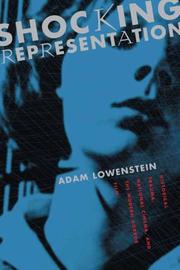| Listing 1 - 4 of 4 |
Sort by
|
Book
ISBN: 9780231166577 9780231166560 9780231538480 0231538480 9781322571812 1322571813 0231166567 0231166575 Year: 2014 Publisher: New York, NY
Abstract | Keywords | Export | Availability | Bookmark
 Loading...
Loading...Choose an application
- Reference Manager
- EndNote
- RefWorks (Direct export to RefWorks)
Video games, YouTube channels, Blu-ray discs, and other forms of "new" media have made theatrical cinema seem "old." A sense of "cinema lost" has accompanied the ascent of digital media, and many worry film's capacity to record the real is fundamentally changing. Yet the Surrealist movement never treated cinema as a realist medium and understood our perceptions of the real itself to be a mirage. Returning to their interpretation of film's aesthetics and function, this book reads the writing, films, and art of Luis Buñuel, Salvador Dalí, Man Ray, André Breton, André Bazin, Roland Barthes, Georges Bataille, Roger Caillois, and Joseph Cornell and recognizes their significance for the films of David Cronenberg, Nakata Hideo, and Atom Egoyan; the American remake of the Japanese Ring (1998); and a YouTube channel devoted to Rock Hudson. Offering a positive alternative to cinema's perceived crisis of realism, this innovative study enriches the meaning of cinematic spectatorship in the twenty-first century.
Motion picture audiences. --- Surrealism in motion pictures. --- Digital media --- Cinéma --- Surréalisme dans le cinéma --- Médias numériques --- Publics --- Cinéma --- Surréalisme dans le cinéma --- Médias numériques --- Film --- Motion picture audiences -- Psychology. --- Motion picture audiences --- Surrealism in motion pictures --- Music, Dance, Drama & Film --- Motion pictures --- Film audiences --- Filmgoers --- Moviegoers --- Moving-picture audiences --- Performing arts --- Audiences

ISBN: 0231132468 0231132476 Year: 2005 Publisher: New York Columbia University Press
Abstract | Keywords | Export | Availability | Bookmark
 Loading...
Loading...Choose an application
- Reference Manager
- EndNote
- RefWorks (Direct export to RefWorks)
In this imaginative new work, Adam Lowenstein explores the ways in which a group of groundbreaking horror films engaged the haunting social conflicts left in the wake of World War II, Hiroshima, and the Vietnam War. Lowenstein centers Shocking Representation around readings of films by Georges Franju, Michael Powell, Shindo Kaneto, Wes Craven, and David Cronenberg. He shows that through allegorical representations these directors' films confronted and challenged comforting historical narratives and notions of national identity intended to soothe public anxieties in the aftermat
Horror films --- Motion pictures and history. --- History and criticism. --- Adam Lowenstein --- film --- horror --- horrorfilms --- film en geschiedenis --- gender studies --- trauma --- psychologie --- film en psychologie --- Franju Georges --- Powell Michael --- Kaneto Shindo --- Craven Wes --- Cronenberg David --- Ground Zero --- 9/11 --- 791.43 --- Motion pictures and history --- History and motion pictures --- Moving-pictures and history --- History --- History and criticism

ISBN: 9786613008343 0231507186 1283008343 9780231507189 0231132468 9780231132466 0231132476 9780231132473 Year: 2005 Publisher: New York Columbia University Press
Abstract | Keywords | Export | Availability | Bookmark
 Loading...
Loading...Choose an application
- Reference Manager
- EndNote
- RefWorks (Direct export to RefWorks)
In this imaginative new work, Adam Lowenstein explores the ways in which a group of groundbreaking horror films engaged the haunting social conflicts left in the wake of World War II, Hiroshima, and the Vietnam War. Lowenstein centers Shocking Representation around readings of films by Georges Franju, Michael Powell, Shindo Kaneto, Wes Craven, and David Cronenberg. He shows that through allegorical representations these directors' films confronted and challenged comforting historical narratives and notions of national identity intended to soothe public anxieties in the aftermat
Horror films - History and criticism. --- Motion pictures and history. --- Horror films --- Motion pictures and history --- Music, Dance, Drama & Film --- Film --- History and motion pictures --- Moving-pictures and history --- History --- History and criticism
Book

ISBN: 9780292735330 Year: 2021 Publisher: Austin
Abstract | Keywords | Export | Availability | Bookmark
 Loading...
Loading...Choose an application
- Reference Manager
- EndNote
- RefWorks (Direct export to RefWorks)
Horror films have exploded in popularity since the tragic events of September 11, 2001, many of them breaking box-office records and generating broad public discourse. These films have attracted A-list talent and earned award nods, while at the same time becoming darker, more disturbing, and increasingly apocalyptic. Why has horror suddenly become more popular, and what does this say about us? What do specific horror films and trends convey about American society in the wake of events so horrific that many pundits initially predicted the death of the genre? How could American audiences, after tasting real horror, want to consume images of violence on screen? Horror after 9/11 represents the first major exploration of the horror genre through the lens of 9/11 and the subsequent transformation of American and global society. Films discussed include the Twilight saga; the Saw series; Hostel; Cloverfield; 28 Days Later; remakes of The Texas Chainsaw Massacre, Dawn of the Dead, and The Hills Have Eyes; and many more. The contributors analyze recent trends in the horror genre, including the rise of 'torture porn,' the big-budget remakes of classic horror films, the reinvention of traditional monsters such as vampires and zombies, and a new awareness of visual technologies as sites of horror in themselves. The essays examine the allegorical role that the horror film has held in the last ten years, and the ways that it has been translating and reinterpreting the discourses and images of terror into its own cinematic language.
Horror films --- Terror in motion pictures. --- September 11 Terrorist Attacks, 2001 --- Motion pictures --- History and criticism. --- Influence.
| Listing 1 - 4 of 4 |
Sort by
|

 Search
Search Feedback
Feedback About UniCat
About UniCat  Help
Help News
News